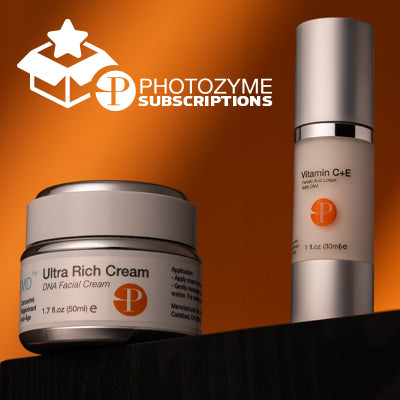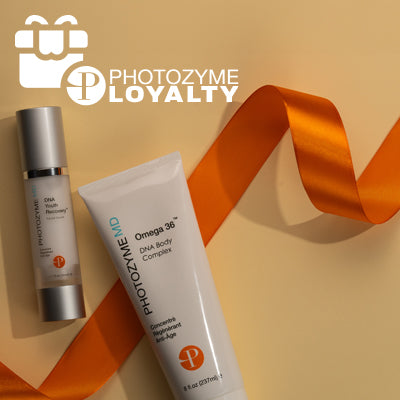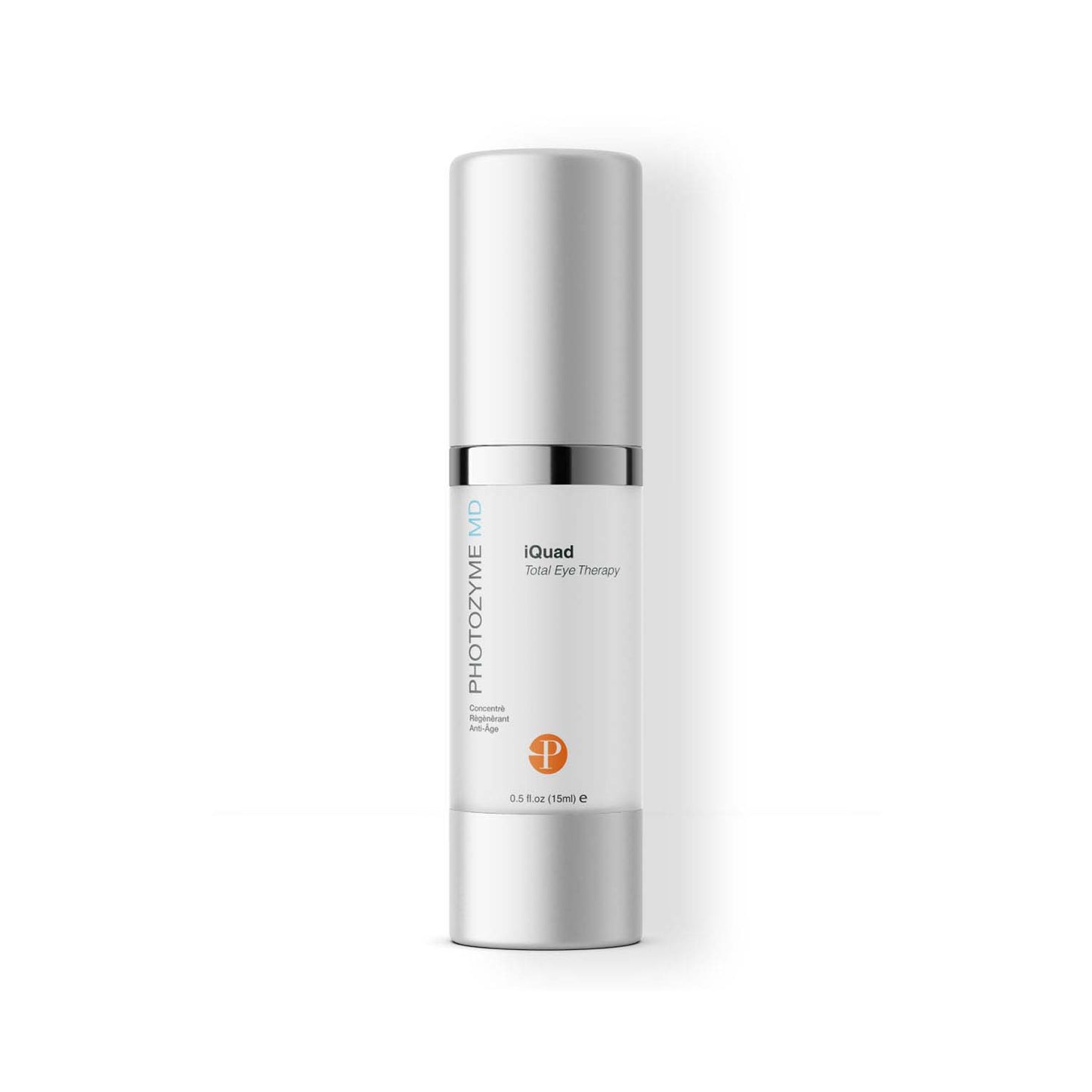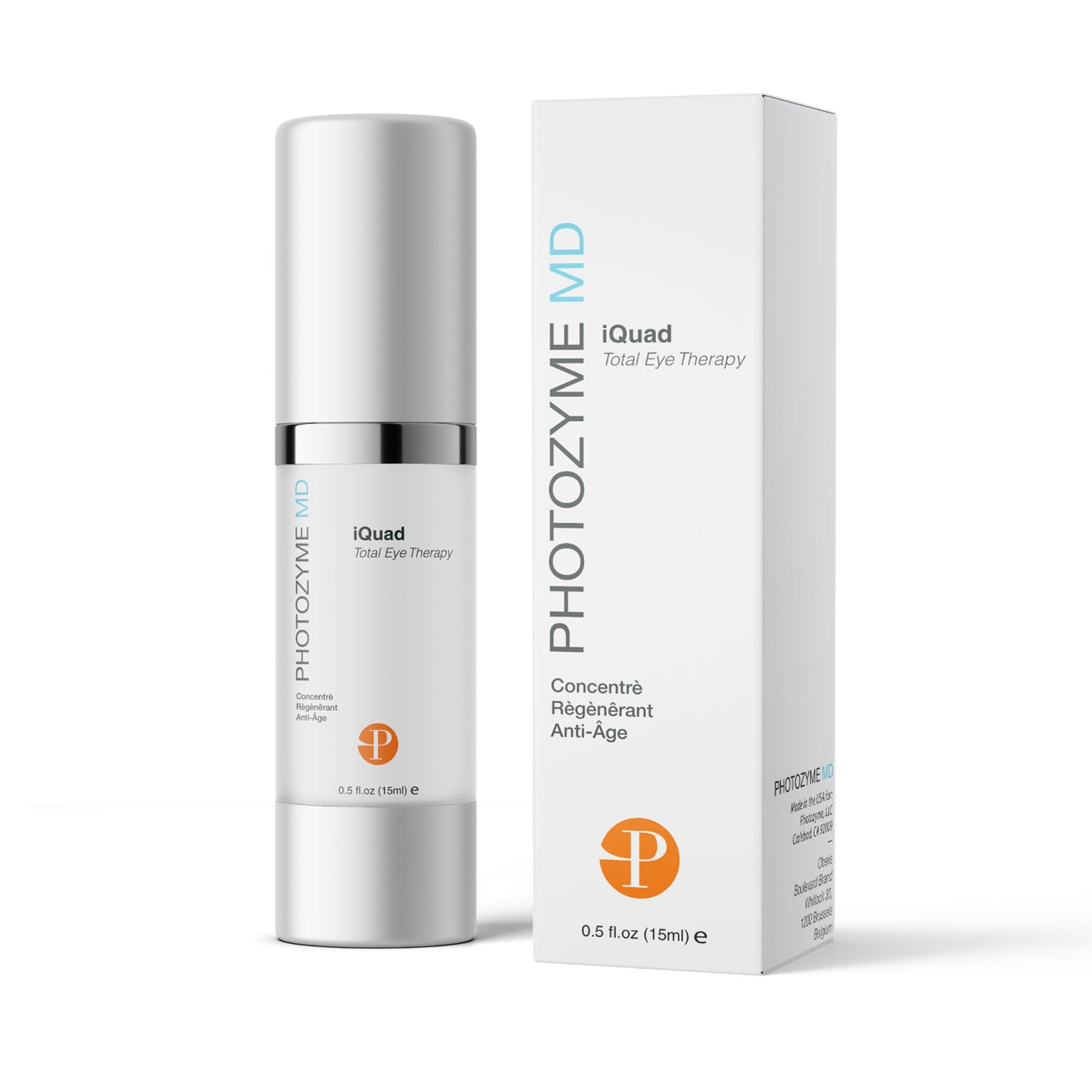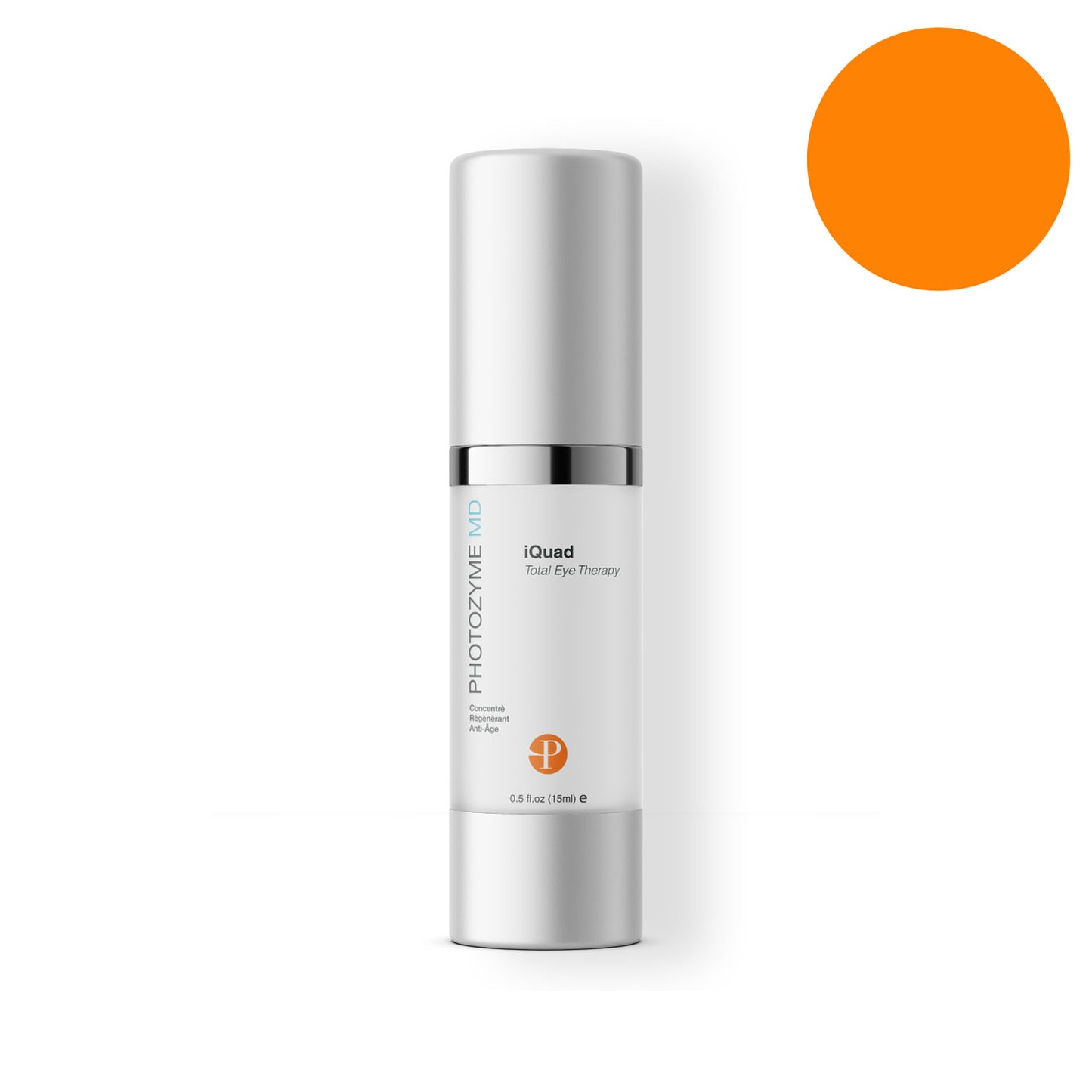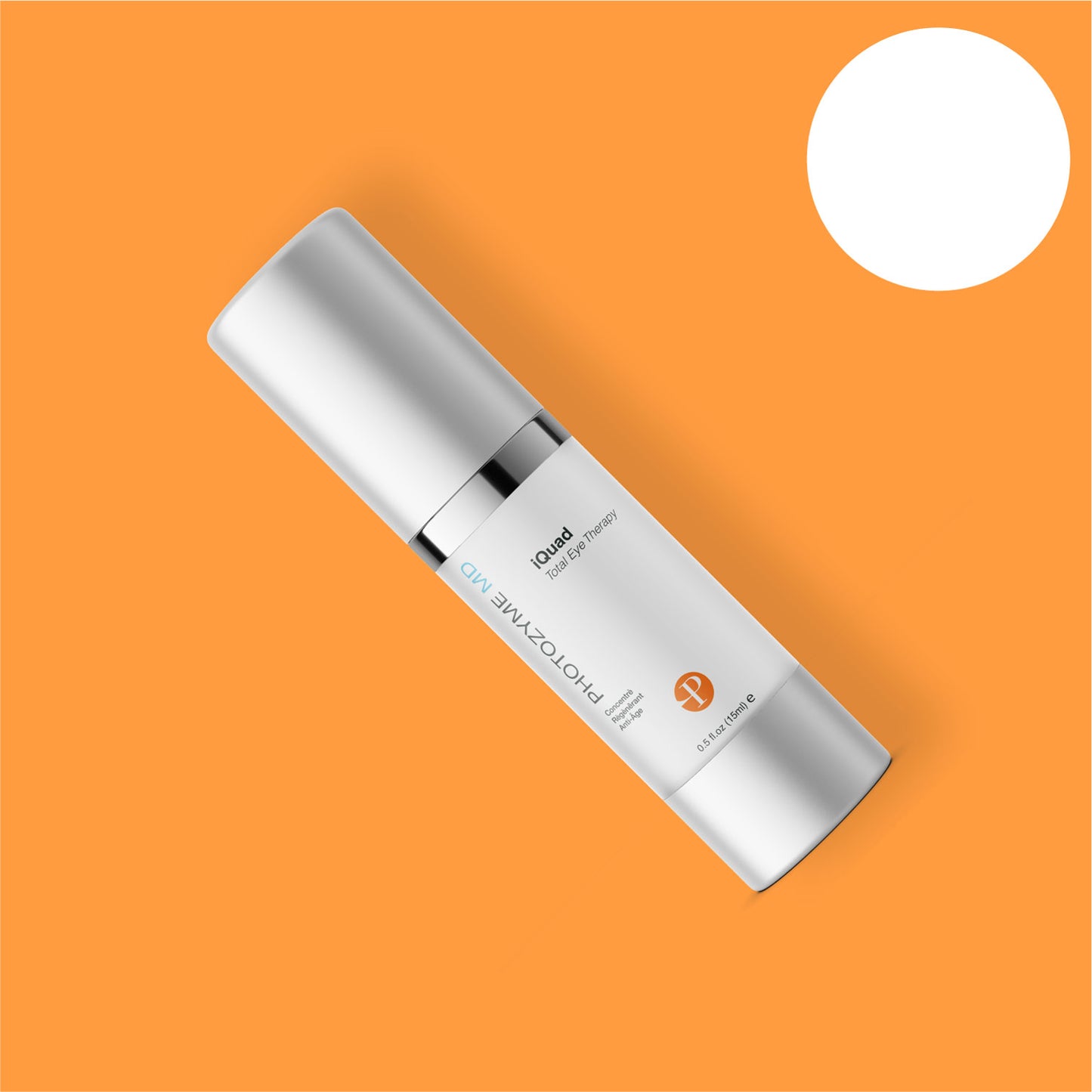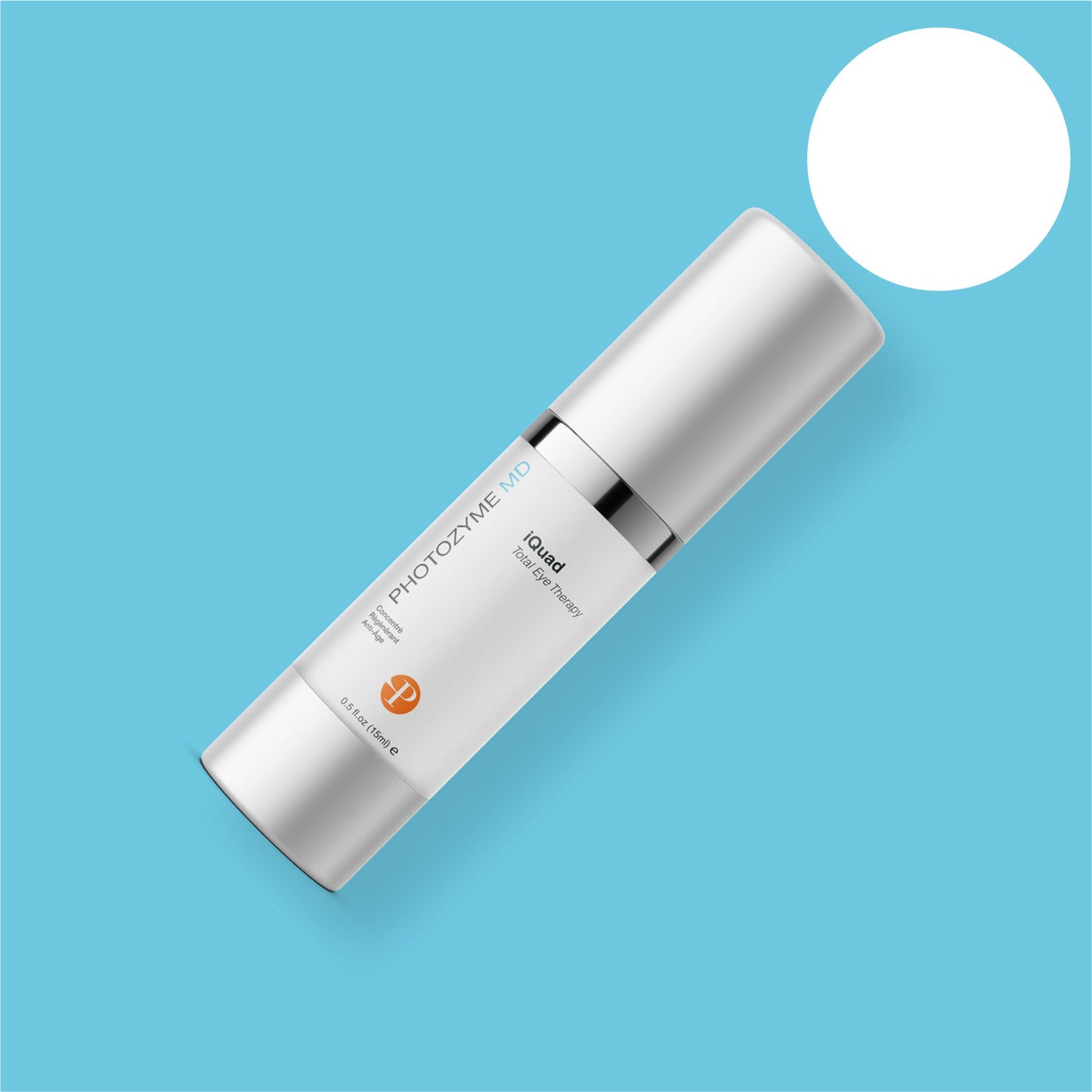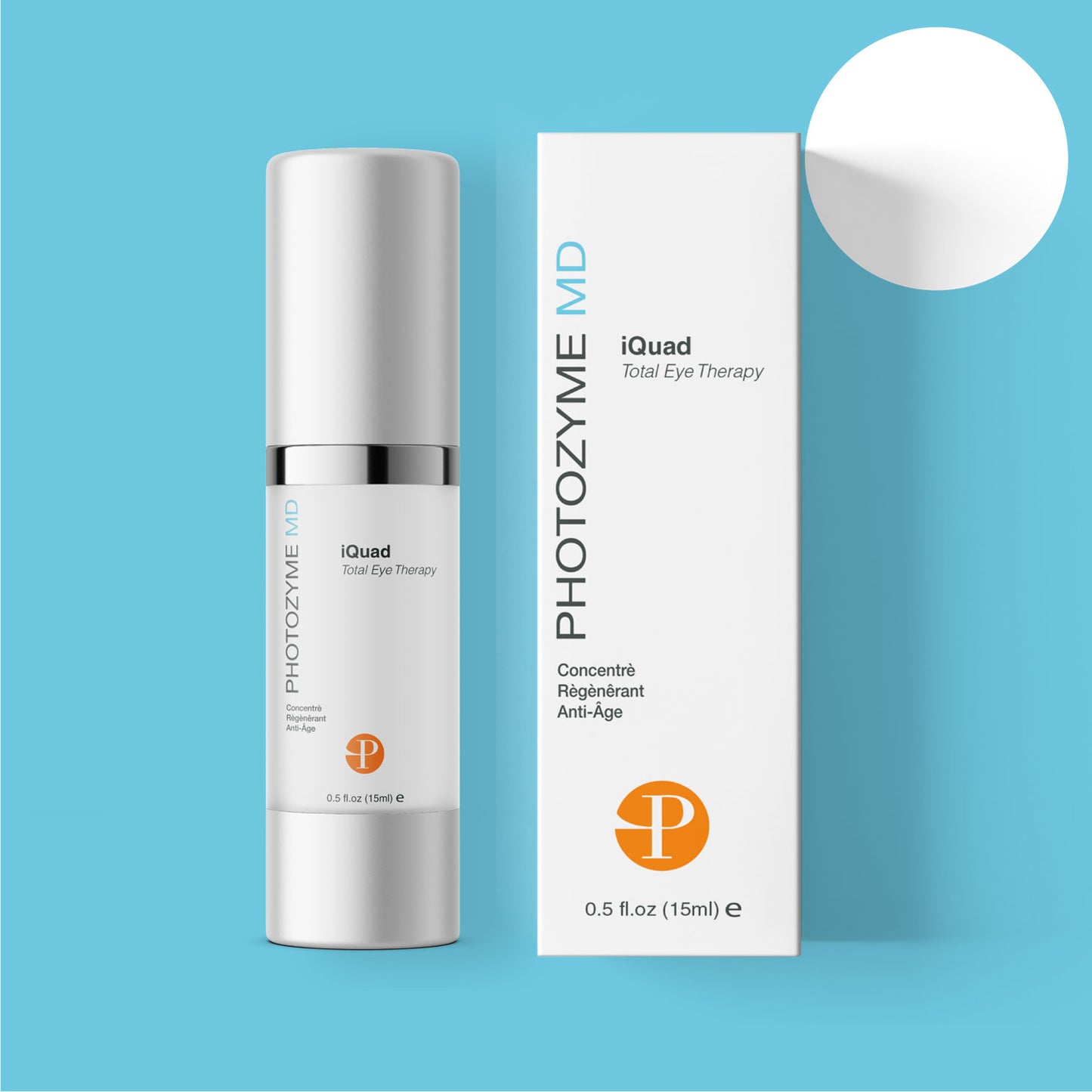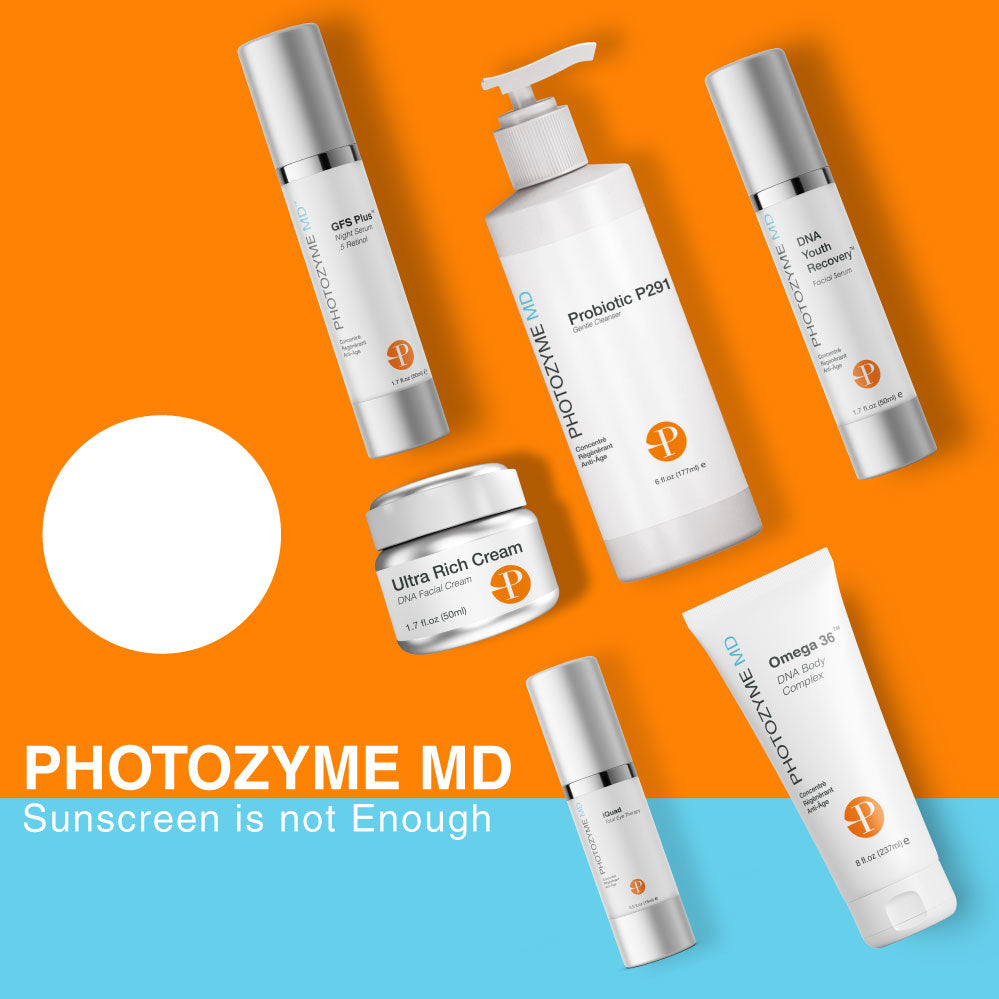This store requires javascript to be enabled for some features to work correctly.
Best Eye Cream For Mature Skin
The delicate area around the eyes often requires special attention, particularly as we age. Mature skin faces increased dryness, more pronounced fine lines and wrinkles, and the appearance of dark circles and puffiness. These concerns call for a targeted solution that goes beyond the ordinary.
iQuad Total Eye Therapy 0.5 fl oz
An age reversal product that firms and tightens delicate skin surrounding the eye. Continued use lightens the appearance of dark circles under the eye and lessens fine lines and wrinkles. A brilliant formula loaded with DNA repair enzymes and a proprietary peptide complex that de-puffs, brightens and fights the signs of aging under the eye.
Benefits
- Stimulates collagen and elastin production
- Reduces puffiness under the eye
- Hydrates and firms skin under the eye
- Reduces crows feet
- Lightens dark circles under the eye
- Fights UV damage caused by the sun
Ingredients
Water (Aqua), Cocoglycerides, Polyacrylamide, Glyceryl Stearate SE, DEA-Cetyl Phosphate, Retinyl Linoleate, Lysophosphatidic acid, Myristol Nonapeptide-3, Myristol Pentapeptide-17, Retinol, Safflower Acids, Tocopherol Acetate, Retinyl Palmitate, Lysolecithin, Polyglyceryl-10-Laurate, Carthamus Tinctorius (Safflower) Glycerides, Acetyl CarboxyMethyl Cocyl Glycerin, Citric Acid, Ascorbic Linoleate, Polyglyceryl-3 Polyricinoleate, Polyglyceryl 5 Oleate, Ethyl Macadamiate, Steareth-20, N-Hydroxysuccinimide, Chrysin, Palmitoyl Tripeptide-1, Palmitoyl Tetrapeptide-7, Hydrolyzed Hyaluronic Acid, Caffeine, Phytonadione, Tocopherol, Linoleate / Oleate, Micrococcus Lysate, Lecithin, Plankton Extract, Glycerin, Hesperidin Methyl Chalcone, Dipeptide-2, Cetearyl Alcohol, Cetearyl Glucoside, Carbomer, Caprylyl Glycol, Phenoxyethanol, Sodium Hydroxide
Directions
Apply once or twice daily to clean skin by dabbing gently to delicate under-eye area.
Shipping
Free shipping on US orders over $50
Key Takeaways:
- Deep Hydration: Mature skin requires specialized eye creams that provide deep hydration, stimulate collagen production, and protect against environmental damage.
- Key Ingredients: Key ingredients such as hyaluronic acid, peptides, retinol, and antioxidants are essential for rejuvenating the delicate skin around the eyes.
- Practical Application: Proper application techniques and preventative measures, including sun protection and a healthy lifestyle, enhance the effectiveness of eye creams for mature skin.
Understanding Eye Creams For Mature Skin
The area around the eye is exceptionally delicate and, consequently, often the first to show signs of aging. Mature skin, characterized by reduced elasticity and moisture, demands a specially formulated eye cream that addresses these concerns comprehensively. Understanding the key components that make an eye cream effective for mature skin is essential for professionals and consumers.
- Hydration Is Paramount: Mature skin benefits immensely from eye creams rich in hyaluronic acid. Hyaluronic acid retains water to plump the skin and reduce the appearance of fine lines and wrinkles.
- Antioxidants Play A Pivotal Role: Ingredients like Vitamin C, Vitamin E, and ferulic acid combat free radicals and address skin tone unevenness, enhancing the overall radiance of the skin around the eyes.
- Peptides And Retinol Stimulate Collagen Production: These ingredients support collagen replenishment, crucial for maintaining skin firmness and elasticity as natural collagen production declines with age.
Identify Signs Of Aging In The Eye Area
The eye area is one of the first places where signs of aging become noticeable, and can manifest in several ways, affecting the skin's appearance and texture.
Fine Lines And Wrinkles
Fine lines and wrinkles around the eyes, often called "crow's feet," are a common sign of aging. They result from repeated facial expressions, such as squinting or smiling, and a decrease in collagen production, which diminishes skin elasticity.
Dark Circles
Dark circles can appear under the eyes due to thinning skin, which makes the blood vessels more prominent. They can also result from fatigue, genetics, or age-related pigmentation changes, which can make tiredness appear.
Puffiness
Puffiness or under-eye bags can occur when fluid accumulates in the area beneath the eyes. This can be due to various factors, including genetics, lack of sleep, and aging, as the tissues and muscles supporting the eyelids weaken.
Dryness
As we age, the skin around the eyes becomes thinner and more prone to dryness. This can lead to a dull and tired appearance. Dry skin may also exacerbate the visibility of fine lines and wrinkles.
Loss Of Elasticity
The loss of skin elasticity and firmness is a significant sign of aging that affects the eye area. Due to decreased collagen and elastin fibers, the eyelids or under-eye area appear droopy or saggy.
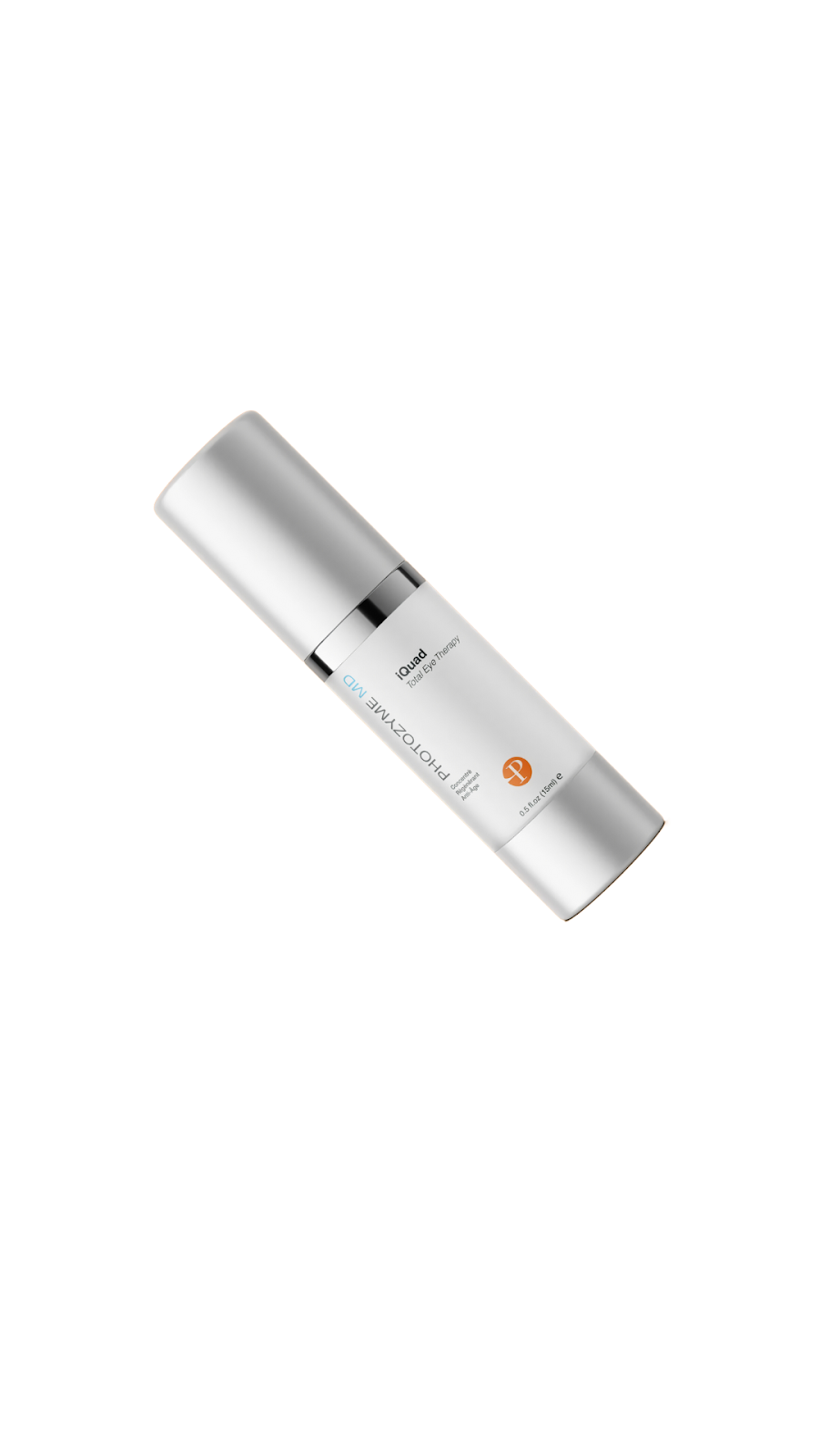
Benefits Of Using Eye Cream For Mature Skin
Mature skin requires targeted treatments designed to address specific concerns like fine lines, wrinkles, and loss of elasticity — especially around the delicate eye area.
Investing in the best eye cream for mature skin can provide several key benefits for maintaining and enhancing the skin's overall health and appearance:
Enhanced Hydration
As the skin ages, its ability to retain moisture decreases, leading to dryness and accentuating the appearance of wrinkles. The best eye creams for mature skin are formulated with potent hydrating ingredients like hyaluronic acid and glycerin. These ingredients help plump the skin, reducing the visibility of fine lines and wrinkles.
Improved Elasticity
With age, collagen and elastin production, two proteins responsible for skin's firmness and elasticity, diminishes. Eye creams designed for mature skin often contain peptides, retinol, and antioxidants like Vitamin C, which are known to support collagen synthesis and protect the skin against further damage.
Reduction Of Dark Circles And Puffiness
The thin skin around the eyes is prone to dark circles and puffiness, which can become more pronounced as we age. The best eye creams for mature skin contain ingredients like caffeine, which can help constrict blood vessels and reduce fluid retention, and niacinamide, known for its brightening properties.
Protection Against Environmental Stressors
Mature skin has a weakened barrier function, making it more susceptible to damage from environmental stressors like UV rays and pollution. Many high-quality eye creams include antioxidants and SPF to shield the skin from these harmful effects. Continuous protection helps prevent new lines and dark spots, ensuring the skin around the eyes remains healthier and more resilient.
Ingredients To Look For In An Eye Cream
When selecting the best eye cream for mature skin, several ingredients cater specifically to aging skin needs:
Retinol
Retinol is a derivative of vitamin A and is well-known for reducing the appearance of fine lines and wrinkles by increasing collagen production. It also enhances skin texture and tone. However, because retinol can irritate some, especially in the delicate eye area, look for formulations specifically designed for sensitive skin or use it in moderation.
Peptides
Peptides are fragments of proteins that are critical components of the skin. They help signal the skin to produce more collagen, thus improving the skin's elasticity and firmness. Peptides in eye creams can help revitalize the skin around the eyes, making it appear firmer and reducing the visibility of fine lines and wrinkles.
Hyaluronic Acid
Hyaluronic acid is an effective hydrator that can hold up to 1,000 times its weight in water, providing significant moisture to the skin. This ingredient helps to plump the skin, reducing the appearance of fine lines and making the skin around the eyes appear more refreshed and youthful.
Antioxidants
Antioxidants such as vitamins C and E, ferulic acid, and green tea extract can help protect the skin from damage by neutralizing free radicals. Vitamin C also supports the skin's natural collagen production and can help lighten dark circles by reducing melanin production.
Niacinamide
Also known as Vitamin B3, niacinamide can help improve the skin's elasticity, diminish dark circles, and reduce the appearance of fine lines by strengthening the skin's barrier function and increasing moisture retention.
Caffeine
Caffeine is known for its anti-inflammatory properties, which can reduce the puffiness and swelling commonly found around the eyes. It also helps tighten and brighten the skin, giving a more awake and youthful appearance.
How To Apply Eye Cream Correctly
Implementing the proper eye cream technique can significantly enhance its effectiveness, particularly for mature skin. Here are expert-approved steps to ensure that you reap the maximum benefits from your eye cream:
- Preparation: Always start with a clean and dry face. Use a gentle cleanser to remove any makeup, dirt, or oils from your skin. This ensures that your pores are open and can absorb the eye cream effectively.
- Use The Correct Amount: Most high-quality eye creams for both eyes require a pea-sized amount. Over-application can lead to product waste and potential irritation.
- Apply Gently: The skin around your eyes is the thinnest and most delicate on your face. Use your ring finger to gently apply the eye cream since it naturally has the lightest touch. Dot the cream around your eye, focusing on the orbital bone, from the inner corners underneath your eye to the outer corners above the eyelid.
- Pat, Don't Rub: Instead of rubbing the cream in, which can pull or stretch the delicate skin, gently pat it into the skin. This technique ensures that the product is absorbed effectively without damaging the skin.
- Wait Before Layering: Allow the eye cream to fully absorb into your skin before moving on to your next skincare step. This usually takes a few minutes. Applying other products too soon can dilute the eye cream and reduce its efficacy.
- Consistency Is Essential: Integrate this routine into your morning and evening skincare regimen for the best results. Regular use will significantly reduce fine lines, wrinkles, and dark circles, rejuvenating the appearance of mature skin.
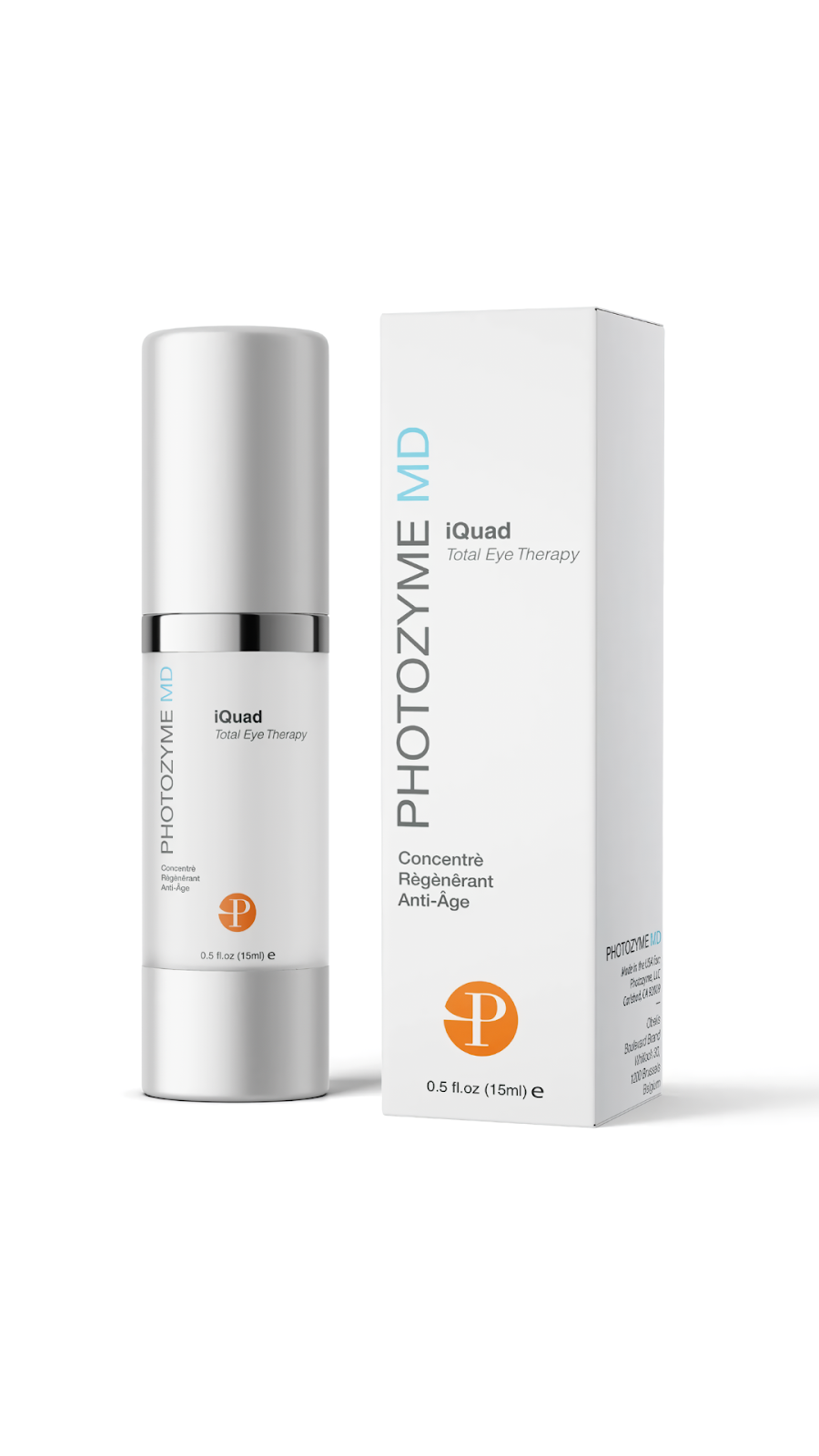
Preventative Measures For Eye Skin Aging
The delicate skin around the eyes is often the first to show signs of aging, such as fine lines, wrinkles, and crow's feet. However, incorporating preventative measures into your skincare regimen can significantly slow the aging process of the eye skin, ensuring a youthful and vibrant appearance for longer:
Use Sun Protection Daily
Protecting the eye area from harmful UV rays is paramount. Daily use of a broad-spectrum sunscreen can prevent premature aging signs. Wearing sunglasses and hats outdoors can shield the eyes from direct sunlight, further protecting the delicate skin.
Maintain A Healthy Lifestyle
A balanced diet rich in antioxidants, such as vitamins C and E, can neutralize free radicals that cause oxidative stress and accelerate skin aging. Regular hydration promotes optimal skin health, while sufficient sleep helps to reduce under-eye bags and circles.
Invest In High-Quality Skincare Products
Opt for eye creams formulated with active ingredients that support the skin's natural repair processes, such as retinol, peptides, and hyaluronic acid. These ingredients can improve skin texture, increase collagen production, and retain moisture, keeping the eye area looking firm and hydrated.
Regular Professional Consultation
Regular consultations with dermatologists or skin care professionals allow for personalized skincare advice and treatments tailored to your skin's unique needs. They can recommend specific products, like those from Photozyme, specially designed to address eye skin aging through innovative and proprietary formulations. Products like Photozyme's DNA Youth Recovery Facial Serum are scientifically developed to effectively target mature skin concerns.
Final Thoughts
Eye creams for mature skin directly address the unique challenges of aging around the delicate eye area. These specialized formulations focus on deep hydration, collagen stimulation, and protection against environmental damage. Key ingredients to look for include hyaluronic acid for moisture retention, retinol and peptides for collagen production, and antioxidants for protection against free radicals.
Proper application techniques, including gentle patting motions with the ring finger, are crucial for maximizing the benefits of eye creams. Additionally, preventative measures like daily sun protection, maintaining a healthy lifestyle, and regular consultations with skincare professionals can significantly slow the aging process of the eye area. By combining the right products with proper application and preventative care, individuals can effectively combat signs of aging and maintain a youthful appearance around their eyes.
Read also:
- 7 Signs Of Aging Skin You Should Look Out For
- What Is Dimethicone?
- DNA Repair Enzymes In Skincare: A Scientific Overview
Sources:
- Eleni Papakonstantinou, Michael Roth, and George Karakiulakis. Hyaluronic acid: A key molecule in skin aging. Dermatoendocrinol. 2012 Jul 1; 4(3): 253–258. doi: 10.4161/derm.21923
- Pumori Saokar Telang. Vitamin C in dermatology. Indian Dermatol Online J. 2013 Apr-Jun; 4(2): 143–146. doi: 10.4103/2229-5178.110593
- Sekyoo Jeong, Seokjeong Yoon, Sungwoo Kim, Juyeon Jung, Myungho Kor, Kayoung Shin, Chaejin Lim, Hyo Sun Han, Haekwang Lee, Kyeong-Yong Park, Jinwan Kim, Hwa Jee Chung, and Hyun Jung Kim. Anti-Wrinkle Benefits of Peptides Complex Stimulating Skin Basement Membrane Proteins Expression. Int J Mol Sci. 2020 Jan; 21(1): 73. Published online 2019 Dec 20. doi: 10.3390/ijms21010073
- Malwina Zasada and Elżbieta Budzisz. Retinoids: active molecules influencing skin structure formation in cosmetic and dermatological treatments. Postepy Dermatol Alergol. 2019 Aug; 36(4): 392–397. Published online 2019 Aug 30. doi: 10.5114/ada.2019.87443
- Donald L Bissett 1, John E Oblong, Cynthia A Berge. Niacinamide: A B vitamin that improves aging facial skin appearance. Dermatol Surg. 2005 Jul;31(7 Pt 2):860-5; discussion 865. doi: 10.1111/j.1524-4725.2005.31732.
- Tuany EichwaldAlexandre Francisco Solano, Jennyffer Souza, Taís Browne de Miranda, Liebert Bernardes Carvalho, Paula Lemes dos Santos Sanna, Rodrigo A. Foganholi da Silva, and Alexandra Latini. Anti-Inflammatory Effect of Caffeine on Muscle under Lipopolysaccharide-Induced Inflammation. Antioxidants (Basel). 2023 Mar; 12(3): 554. Published online 2023 Feb 23. doi: 10.3390/antiox12030554
How does eye cream for mature skin differ from regular eye cream?
Eye creams for mature skin have higher concentrations of active ingredients like antioxidants, peptides, and retinol. They are designed to more effectively target aging concerns such as fine lines and wrinkles than regular eye creams.
Can eye cream reduce the appearance of deep wrinkles?
Yes, eye creams with hydrating ingredients like hyaluronic acid and collagen-boosting peptides can plump and rebuild the skin, reducing the appearance of deep wrinkles.
How often should I apply eye cream?
Apply eye cream twice daily, morning and night, for consistent hydration and optimal results.
Can eye cream improve skin elasticity around the eyes?
Yes, eye creams with elastin stimulators and firming peptides can improve skin elasticity and firmness around the eyes.
How long does it take to see results from using eye cream on mature skin?
Results typically begin to show within 4 to 6 weeks of consistent use, with more noticeable improvements over time.
Is retinol beneficial in eye creams for mature skin?
Yes, retinol boosts collagen production and reduces fine lines, but start with lower concentrations to gauge skin tolerance.
Sign Up And Save $25
Join Our Mailing List
Receive discounts and tips for your skin care routine!

